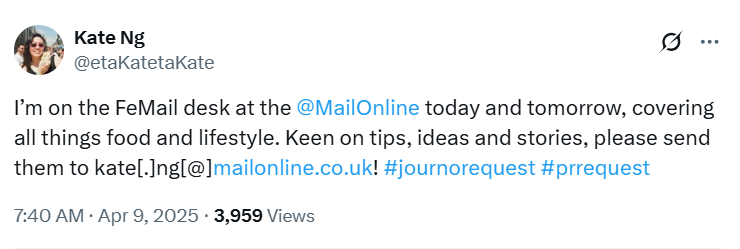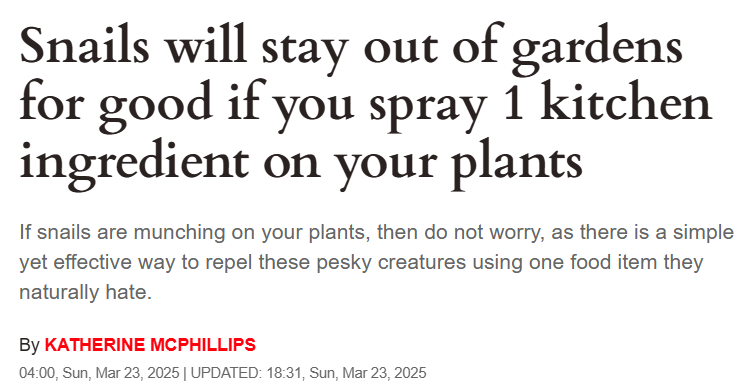With journalists receiving hundreds of pitches every single day, usually on very similar topics, cutting through the noise is more important than ever if you want to secure high-quality coverage. The question is, how?
At Reflect Digital, we believe building strong relationships with journalists is the key to Digital PR success, helping you secure consistent coverage in relevant, high-authority publications. In 2024, our relationships with lifestyle and gardening journalists were integral to the Digital PR strategy of our client, Hopes Grove Nurseries. Throughout the year, we secured:
- 397 pieces of coverage
- 633 backlinks
- 2.4 billion combined audience
The best part? We have continued to nurture these relationships in 2025, still securing record numbers of coverage each month. In this blog, we’ll be highlighting the ways in which you can build meaningful relationships with journalists that lead to consistent, relevant and high-quality coverage.
#1 Do your research
If you want to build strong relationships with journalists, you need to be providing them with the exact type of content they’re looking for. There’s no point pitching a story about gardening tips if they cover travel advice. Equally, just because they cover travel advice, it doesn’t mean they’ll cover all types of travel stories.
Understanding what a journalist writes about demonstrates respect for their craft. If you consistently send pitches that aren’t relevant, journalists will likely ignore anything that you send to them and go to a competitor for expert commentary over you.
This is why research is one of the most important parts of developing relationships with journalists. What do you need to look out for to understand whether you should pitch to a journalist?
- When was the last time they published an article? If it was over a year ago, they may not work at the publication anymore.
- What topics do they write about?
- Have they already covered the story you’re pitching?
- Do they have local expertise or national?
- Is the publication they write for relevant to your brand?
Many publications will have author profiles with a short biography about the topics they write on. This can be a great starting point to understand whether your pitch will be relevant for the journalist.

It’s important to keep in mind that these are sometimes not updated immediately if a journalist moves to a new beat so you should always look at their recent articles too.
By conducting thorough research ahead of pitching to journalists, you’ll provide relevant stories to journalists that will cut through the noise, show you respect the work they do, and also save yourself time sending irrelevant pitches.
#2 Nurture your relationship
Want to build meaningful relationships with journalists that lead to consistent coverage? You need to put time and effort into nurturing a connection. As with all relationships, it works both ways so if you want a journalist to come to you for expert commentary over your competitors, you also need to go above and beyond for them.
What are our top tips for nurturing a relationship with a journalist?
- Introduce yourself - Often, journalists will post on social media if they’ve moved to a new publication or are spending time on a specific newsdesk. If your clients meet the requirements for what they’re looking for, introduce yourself and send over a relevant pitch. If you don’t currently have a pitch, you could still introduce yourself as they may keep you in mind for future articles.

- Show an interest - Journalists spend hours everyday writing interesting, data-led articles that capture the attention of people around the world. If you want to develop a stronger relationship with a journalist, take time to engage with the articles they’ve written and show your support for them. This could involve re-posting them on social media, or reaching out to express interest in a particular article.
- Go the extra mile - How can you add value to your relationship? Whether it’s sharing additional data (more on that in section #4), proactively sending expert commentary to them or offering exclusives, you can enhance your relationship even further and demonstrate why they should work with you over competitors
Fun fact about offering an exclusive to journalists? This will evoke the exclusivity bias, a behavioural principle whereby people naturally crave status and seek products and experiences that give them special treatment. By pitching a journalist a story that no one else has access to, they’re more likely to want to work with you and cover the story because it boosts their status above other journalists.

Ultimately it takes time to build credibility and trust, but being consistent, reliable and showing a genuine interest in creating engaging, human-interest stories will help you establish mutually-beneficial relationships with journalists.
#3 Personalisation is key
Our next tip for developing impactful relationships with journalists is honing the art of personalisation. No matter what you’re doing, whether it’s Digital PR, Paid Media or Content Writing, if you want to connect with your target audience, you need to appeal directly to them. This applies to journalists, consumers and businesses all the same.
How can you personalise your pitches for specific journalists?
- Always refer to the journalist by name (never write ‘hi there’)
- If you’re pitching to them because of a recent article they’ve written that’s similar to your story, refer to it in your pitch
- Highlight the most relevant parts of the story
- Explain clearly and concisely why your story will appeal to their audience
We demonstrated how effective personalisation is for connecting with journalists recently when our client, Morris Hankinson, Director at Hopes Groves Nurseries, shared expert commentary around spring gardening. He provided a lot of content around what to plant, gardening jobs to do, hacks for dealing with spring-related problems and other tips.
While all of the content was useful and insightful, we knew not all of it would appeal to every journalist, so we tailored each pitch to focus on the parts of the spring content that would be most relevant for them. For example, some journalists prefer plant-specific content, whereas others write about hacks.

This led to five individual pieces of coverage in the Daily Express from different journalists, as well as high-authority coverage in other top tier publications, because we personalised each pitch to highlight the most relevant part of the content.
#4 Demonstrate authority and expertise
When writing stories, journalists want input from professionals, experts and industry-leaders that can add authority and credibility to the article. If you can demonstrate that you are the most knowledgeable and qualified person to speak on a particular subject, journalists will likely come back to you for expert commentary whenever they’re writing on that topic. Learn more about why expert commentary is gold for journalists.
While there can be occasions where one sentence answers are appropriate, providing as much insight and detail as possible will usually help journalists more. It’s also important that any comments you send to journalists are attributed to a person, rather than a brand (e.g. “Becky Hutton, Holiday Planner at Sunsail” rather than “a spokesperson from Sunsail” or even just “Sunsail”). This is because, according to the behavioural nudge Authority Bias, people are more likely to be influenced by the opinions of an authority figure.
Another way of demonstrating authority and expertise on a particular topic is to send additional data over to the journalist that could help when they write up the article. For example, if they’ve asked for expert commentary about Mediterranean sailing holidays, you could use Google Ads Keyword Planner to see if there’s any relevant online search data that can back up your commentary.

#5 Respond quickly and be transparent
Journalists often work to extremely tight deadlines and sometimes even need to receive comments back from clients within the hour. It’s a very fast-paced environment, so it’s important to respond as quickly as possible to requests and to keep journalists updated regularly.
If they don’t hear back from you, they’ll find someone else to receive comments from and likely won’t trust you to support with future articles.
One way you can react to journalists’ requests quickly is by creating a bank of content from your client with expert commentary on a range of relevant topics. This way, when a journalist gets in touch about a topic your client has spoken on before, you’ll have the content ready to go. This, of course, won’t work for every request as journalists may have very specific questions but it can be useful for many requests.
This doesn’t mean you must be available for any and all requests that come through. Naturally, there will be situations where your client doesn’t feel that they’re best placed to comment and times where your client is unavailable to provide commentary by the given deadline. However, it’s crucial that you’re transparent and inform the journalist in a timely manner, so that they can make other arrangements.
If you respond quickly, explain the situation and try to offer alternative solutions, journalists are more likely to still come to you for future articles. If you don’t, they may feel that you’ve wasted their time and will not reach out again.

In this scenario, our client was unavailable, so we informed the journalist as soon as possible and shared useful resources that could provide insight into the topic. As our client is usually able to help with requests and has built up credibility through consistently insightful commentary, the journalist offered to extend the deadline to ensure our client could contribute to the article!
Key Takeaways
By developing impactful relationships with journalists, you can gain consistent coverage in relevant, high-authority publications. Ultimately, this will help to increase brand awareness and improve your backlink profile. Our top tips for building strong relationships with journalists?
- Do your research before pitching to journalists, ensuring your story is relevant, timely and likely to be of interest. Just because a journalist was covering travel stories last year, it doesn’t mean they are this year so keep your press lists updated.
- Take time to nurture relationships and build credibility. It’s not a one-sided relationship, so you need to provide as much value to journalists as they will to you when they cover your story.
- Personalise pitches to each journalist, highlighting the most relevant parts of your story. If they often publish data-led stories and reports, lead with the numbers. However, if they often cover hacks, warnings and tips then lead with the expert commentary.
- Demonstrate authority and expertise at all times, whether that’s through insightful expert commentary or additional online search data. If your client is a reliable source of information, journalists will reach out time and time again.
- Respond as quickly as possible to journalists’ requests and keep them updated frequently. It’s okay if your client is unavailable, but make the journalist aware as soon as possible and try to provide alternative resources.
Do you want to build meaningful media relationships and take your brand’s online presence to the next level? Get in touch with us today to learn more about how our Digital PR specialists can support you with crafting strong relationships with journalists that lead to relevant, authoritative coverage!
Contact Us
MEET THE AUTHOR.
MORGAN RODWAY-WING
Wordsmith Morgan joined the Reflect Digital team fresh out of University and is learning about the world of digital marketing while supporting the SEO team with highly engaging content. With a background in website administration and social media, she also brings a broader perspective to her clients.
More about Morgan






















